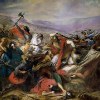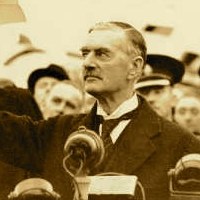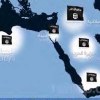![]()
Wednesday, July 27, 2016 | By R. Joseph Hoffmann
“All our religion is but a false religion, and all our virtues are mere illusions and we ourselves are only hypocrites in the sight of God, if we have not that universal charity for everyone — for the good, and for the bad, for the poor and for the rich, and for all those who do us harm.” — St Jean-Marie Vianney, the Curé of Ars.
Father Jacques Hamel, an auxiliary priest appointed to the parish of Saint-Étienne-du-Rouvray, was celebrating morning mass on Tuesday when two men barged into the church, seized the old man, forced him to his knees and slit his throat. They then said prayers in Arabic while circumambulating the altar, in a charade of Catholic liturgy, and one preached a short sermon from the ambo.
It is another episode in the ongoing attempt by ISIS to produce ever-more grotesque warnings to unbelievers that their brand of Islam still believes in seventh-century forms of sacrifice and talion as the price of unbelief. Beheadings, mass execution, dismemberment, burning, and vivisepulture are all on their menu. Human sacrifice is an innovation — so new that French authorities who have provided security to mosques and synagogues had not thought to do the same for the ancestral faith. After all, who would kill a country priest at the altar?
Following spasms of violence by self-radicalized IS “soldiers” in Nice, Munich and Orlando, this latest episode seems to differ only in the mechanism of death. If IS measures its success in body counts and damage done, this appears to be a relatively modest example of its outreach.
But that is the wrong way to see this event.
Like many European countries, France prides itself on being “post-Christian”: secular and pluralistic. Its indifference to religion is more pro-active than its neighbours’ — extending to rules against the wearing of hijab and other displays considered offensive to the spirit of the Republic. To Rome, France is the “eldest daughter of the Church.” But its ecclesiastical privilege has to be shared with a tradition of hostility towards religion exemplified in the writings of Voltaire, Diderot, and above all Paul-Henrl Thiry, (Baron d’Holbach) who wrote in 1769,
“Religion has ever filled the mind of man with darkness, and kept him in ignorance of his real duties and true interest. It is only by dispelling the clouds and phantoms of Religion, that we shall discover Truth, Reason, and Morality. Religion diverts us from the causes of evils, and from the remedies which nature prescribes; far from curing, it only aggravates, multiplies, and perpetuates them.”
The secular and revolutionary spirit that was directed against French religion in general, Catholicism especially and the Jesuits in particular, was mitigated by the Reign of Terror (1791-1793), a chapter in French cultural history that proved that excess and passion are not the sole property of religion, and that revolutionary zeal is subject to the disconfirming experience of ordinary citizens who crave peace, calm, reassurance — the things religion had traditionally offered. This tension in French culture has been a constant from the early nineteenth century until today: A country committed to the secular, actively indifferent to religion (in a way Americans and even the British and Germans are not), but aware that French intellectual culture is shot through with the ancient remains of the one, holy, Catholic and Apostolic Church. Derrida’s deconstruction of apophatic theology is only original if one ignores the whole history of French philosophy from the time of Irenaeus of Lyons, prompting some of his contemporaries to comment that French intellectualism is immersed in religion as a fish is in water. One can flop around on dry land for a bit, but not survive there.
In the last century and a half, as Rome has increasingly lost its political hold on Europe and the difference between Catholics and skeptics has become a matter of inflection, Christianity (at a domestic level) has become a benign and pastoral thing. Unlike England, occasions of state in France are secular affairs. Unlike America, the political process (until recently anyway) was largely unaffected by religion.
But that is changing, even in the political sphere. Religious commentary and Biblical references are on the rise; during the 2007 presidential campaign two of the candidates, Nicolas Sarkozy and Ségolène Royal, both raised as Roman Catholics, made a number of positive references to their faith. The French media is increasingly open to asking candidates about how their religious faith affects their decision making or enriches their life. Even on the left, anti-globalisation activist José Bové cites his indebtedness to Catholic values, and Marie-Georges Buffet, the head of the French Communist Party strongly opposes any anti-religious interpretations of French secularism. The attitudes are broadly in harmony with the views of Pope Emeritus Benedict XVI and Pope Francis, which while not advocating return to the privileged status of the Catholic church pre-1905 call for France and Europe generally to remember where it came from: that the values of peace, fraternity, and compassion are rooted in the Gospel and are part of the historical legacy of the Church. In France, more than other places, this legacy also includes philosophy, music, the arts and distinctively French literary movements, including postmodernism and hermeneutics.
The parishioners of Saint Etienne de Rouvray probably do not care much about history or Emmanuel Levinas. They had gathered in a safe and familiar space to celebrate a familiar rite with a trusted priest. Mercea Eliade envisages such familiarity when he defines what is meant by a “sacred space.” An obvious example for us, he writes in The Sacred and the Profane, is the church, whose door is a threshold between the profane on the outside and the sacred inside. An equivalent to the church in archaic cultures was the sacred enclosure, which opened upwards towards the sky, the world of the gods. Believers going into a church leave the world of chaos outside. Their purposes are not practical, but to make contact with something that transcends a world where bills have to be paid, children have to be collected from school, and wages have to be earned. For all the secularizing that has gone on in the last two centuries, many people still find the door of a church an access to an enclosure that protects them from the grim realities of everyday life. In a word, it is where God speaks to them, consoles them, and protects them.
The IS “soldiers” who invaded this enclosure with knives drawn and who slit the throat of an 85 year old priest in the name of Allah, the greatest, the merciful, achieved something they had not yet managed to achieve: Sacrilege. It doesn’t matter that French atheists in a Normandy village or in the city of Rouen with its magical cathedral, immortalized by Monet, don’t believe the doctrine of the Catholic church, don’t take communion, and don’t ask their children to say the rosary as their grandparents might have done. They will still understand and react to the violation of what Eliade called “the holy.” Catholics everywhere will react viscerally to this ritual slaughter because they will remember the Church’s teaching that the priest, in a special and sacramental way, represents Christ. And they will make the distinction between a priest sitting on a park bench reading le Figaro or zig zagging to avoid a weaponized truck in Nice who “happens” to get caught up in an act of absurd violence, and a priest exercising his office, celebrating the Eucharist while standing at the altar.
Once upon a time, we called men like Father Jacques “martyrs.” The word simply means witnesses. We won’t do it this time, because to do so would dignify the role of his assassins as legitimate combatants rather than as violent criminals. It would also put the Church at war with an insidious form of Islamic fundamentalism. The Pope has called the sacrifice of Father Jacques “senseless” and “absurd.” Looked at as an act of simple violence, perhaps that’s the best way to frame it. Yet violence is never simple and never totally absurd. For the people of France, evaluating day by day their relationship with a religiously chaotic world, the desecration of the parish of Saint-Étienne-du-Rouvray, has significance far beyond the door of the church.
R. Joseph Hoffmann graduated from Harvard Divinity School and the University of Oxford (Ancient Near Eastern Studies). Hoffmann was tutor in Greek at Keble College and Senior Scholar at St Cross College, Oxford, and Wissenschaftlicher Assistent in Patristics and Classical Studies at the University of Heidelberg. He taught at universities in the United States, Britain and Lebanon. He has held visiting positions at universities in Africa, the Middle East, the Pacific and South Asia. He is now Professor of Liberal Arts at the American University of Central Asia. Beyond academe, he is well known for his advocacy of the humanist tradition. In his recent work, Hoffmann has turned increasingly to the work of ”humanist restoration”. His most recent books include an edited volume entitled Just War and Jihad: Violence in Judaism, Christianity and Islam (2006) and Sources of the Jesus Tradition (2010.) His study of the concept of the right to life in early Christianity, Faith and Foeticide, will be published in 2015, along with another in his series of translations of the classical philosophical critiques of the Christian movement: Christianity: The Minor Critics. He blogs at The New Oxonian. Read his full biography here. For all the exclusive blog entries by R. Joseph Hoffmann, go here.



 RSS
RSS











Latest Comments
Hello Mike, Thank you for your positive feedback to the article. I felt there wasn’t too much critical analysis of ...
Thanks for this considered and well constructed article. A follow up article on the manner in which the editorial contro...
THE CLUELESSNESS OF CLAIMING THAT OBAMA'S MIDDLE EAST POLICIES WERE A FAILURE CANNOT BE FURTHER FROM THE TRUTH, WHAT THE...
As long as Obama is the president of the usa do not trust the us government......
Thank you for an good read....